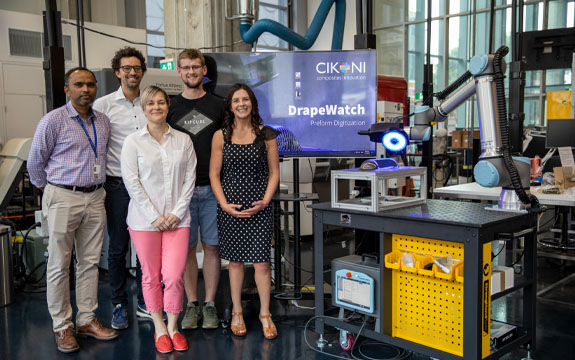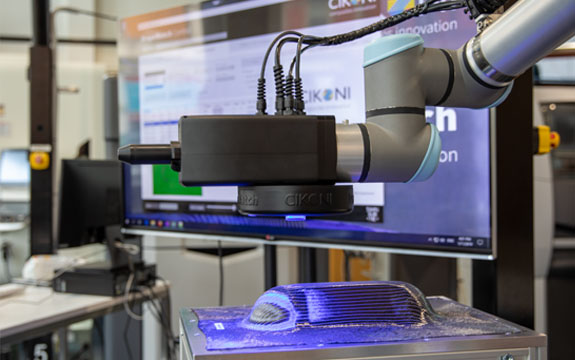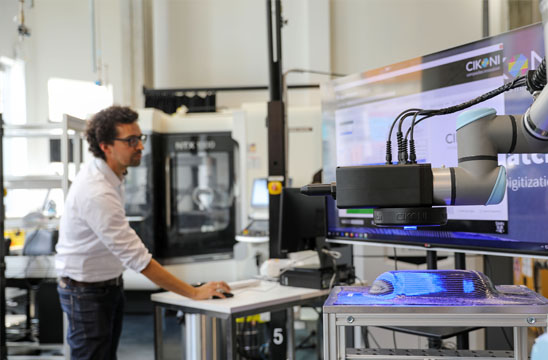Swinburne’s Factory of the Future receives sleek, new robot to detect carbon fibre defects

In Summary
- Swinburne’s Factory of the Future receives a new carbon fibre inspection system, Drapewatch, that will help with early detection of deformities during production
- Carbon fibres are small, super strong but lightweight threads of carbon used in many aerospace and civil engineering projects
- The world-first robot has been installed as part of a collaboration between Swinburne, the University of Stuttgart, its innovation hub Arena 2036 and German composite engineering company CIKONI
A world-first, fully digitalised inspection system to detect defects in carbon fibre composite production has been installed in Swinburne’s Factory of the Future.
The system will be integrated into Swinburne’s Industry 4.0 Testlab for 3D printing of carbon fibre composites in 2020, and has the capacity to reduce costs and manufacturing time.
The collaborative robotic system, known as DrapeWatch, has been installed as part of a partnership between Swinburne; the University of Stuttgart; their industry on campus research facility, ARENA2036; and German composite technology and engineering company CIKONI.
What are carbon fibres?
Carbon fibres are tiny threads of carbon that, when bound together with a polymer, are used to create strong, lightweight materials in aircraft, satellite, civil engineering, and automotive components.
The fibres are rigid and chemically resistant with a high strength and heat tolerance, which makes them ideal for the development of high-performance parts.
A precise system
 DrapeWatch is composed of a vision-sensing system and a probe to study the defects and send back data.
DrapeWatch is composed of a vision-sensing system and a probe to study the defects and send back data.
To demonstrate how DrapeWatch can identify gaps, misalignments and other irregularities, Swinburne researchers are using a representative ‘double-dome’ geometry. This complex shape, made of two conjoined domes, is commonly used in engineering for moulding tests, because the curvature can produce defects to test the system’s precision.
The robot is used to control a vision-sensing system that allows the outermost layer to be inspected, as well as an additional probe to study internal defects and send back data. The clever innovation from CIKONI is in the artificial intelligence algorithms that analyse this data.
Carbon fibre composite manufacturing can be a slow and expensive process. The early detection of defects using DrapeWatch will reduce unnecessary costs and waste. The collaborative robot is designed to work in partnership with human beings, eliminating the need for fencing or safety features as it stops when it senses close human movement.
Contributing to Industry 4.0
The Factory of the Future, which is a hub to connect manufacturing businesses to staff, students and the community, is connected with Swinburne’s Manufacturing Futures Research Institute. The institute’s director, Professor Bronwyn Fox, says the facility enables Australian manufacturers to have access to cutting edge technology that contributes to the fourth industrial revolution or Industry 4.0, which is the rapid advancement of digital technologies to enhance products and machines in the physical world.
“Manufacturing process inspection is a pillar of Industry 4.0, because it gives you the ability to measure, monitor and inspect the process, collect that data and then use it to enhance process improvement and flexible manufacturing processes.
“This technology is strategically aligned with Swinburne’s university-wide Industry 4.0 strategy and we’re very excited to be working with such an innovative company like CIKONI and their unique technology, and to be demonstrating that to industry here in Australia.”
CIKONI Founder and Managing Partner Dr Jan-Philipp Fuhr says the project creates ongoing benefits for industry research.
 Dr Fuhr demonstrates how the innovative carbon fibre inspection system works.
Dr Fuhr demonstrates how the innovative carbon fibre inspection system works.
“CIKONI, as the developer of DrapeWatch, is honoured to work with Swinburne University of Technology, and especially with their Factory of the Future, on this innovative inspection system.
"We are looking forward to continuing our close collaboration with Swinburne on DrapeWatch and other innovative composite technology to enable improvements of automated composites production and inspection.”
Swinburne has a research partnership with the University of Stuttgart, which enables the institutions to combine their expertise in advanced manufacturing. This shared commitment to technological innovation and productivity has been ongoing since 2017 and has since contributed extensively to Swinburne’s promotion of Industry 4.0.
About University of Stuttgart and ARENA2036
The University of Stuttgart is one of the leading technically-focussed universities in Germany and has a strong international reputation for research and innovation.
ARENA2036 is the industry on campus model for research at the University of Stuttgart. Swinburne joined ARENA2036 as a full partner in November 2018, to collaborate in high-tech manufacturing research and development.

